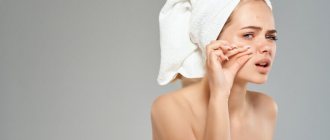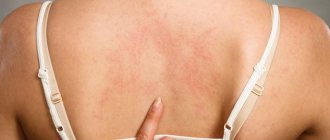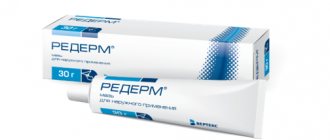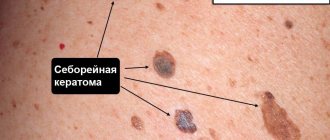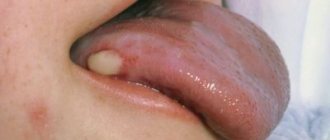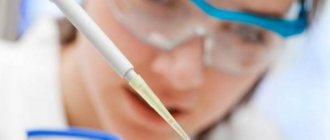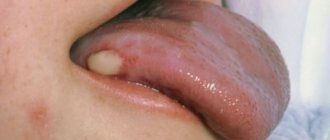Diagnostics
Even twenty years ago, doctors diagnosed 90% of their patients with allergic rashes as “idiopathic urticaria” - after all, doctors did not have all the necessary techniques in their arsenal to determine the causes of allergies.
Nowadays, skin tests, special tests to determine the allergen, immunological blood tests to determine the allergic nature of the disease and other modern techniques are carried out, allowing the doctor to make an accurate diagnosis and prescribe effective treatment.
If the allergen cannot be identified, the patient is referred for a consultation with an ENT doctor, dermatologist or urologist to identify diseases that may manifest as idiopathic urticaria. Specialists prescribe a number of additional studies, such as ultrasound, endoscopy and determination of the level of hormones of the endocrine glands in the blood.
Treatment methods
Hives go away on their own or after a single dose of antiallergic medications. Otherwise, long-term treatment with drugs in the required dosage is required. Having found out the root cause, they can treat in the following ways:
- Histaglobulin. Used for chronic, hereditary forms. Helps prevent laryngeal swelling in severe cases.
- Local cupping. Rashes on the face and hands are treated with ointments, folk remedies, and compresses.
- Systemic therapy. Antihistamines and decongestants are prescribed in different dosages.
- Etiotropic therapy. They eliminate any allergens, remove dust from surfaces, and regulate eating habits.
- Dexamethasone. Used to relieve the generalized form, can be replaced with Prednisolone.
First, second and third generation products are used. Due to the characteristics of the manifestations, the drug is often selected experimentally. Urticaria can be cured only after determining the cause of the disease. When angioedema develops, first aid is provided, allergy sufferers are given an intramuscular drug, and an ambulance is called.
Sources
- Federal clinical guidelines for the diagnosis and treatment of urticaria. M.: Russian Association of Allergists and Clinical Immunologists, 2015. p. 34.
- Federal clinical guidelines for the management of patients with urticaria. M.: Russian Society of Dermatovenerologists and Cosmetologists, 2015. p. 24.
- Guideline for the definition, classification, diagnosis and management of urticaria: the 2013 revision and update / Zuberbier T., Aberer W., Asero R. // Allergy 2014: 69: 868-887.
- Luss. L.V. Causes and treatment of urticaria in children // Medical Council, 2015. – No. 14.
How to treat an adult?
The doctor examines and interviews the patient and prescribes laboratory tests. To treat rashes and swelling, it is necessary to find out the provoking factor. Urticaria can appear due to nervousness, while taking medications, as a symptom of a disease of the gastrointestinal tract. Physiotherapy, nutritional changes, and medications are used for treatment. Treatment is supplemented with folk remedies, correcting nutrition and eliminating contact with allergens.
| Method of therapy | Reasons | Drug names |
| Injections | Used for severe manifestations, to relieve extensive skin lesions. | Diphenhydramine Adrenaline Suprastin |
| Pills | Antihistamines are prescribed in the subacute period. Reduce the intensity of symptoms. | Diazolin Claritin Zyrtec Tavegil |
| Vitamins | Reduce the frequency of symptoms and minimize the risk of an acute phase. | Magnesium Vitamin PP Vitamin C, A, B12 |
| Hormonal agents | The fastest possible effect on extensive skin lesions. But hormonal drugs have a long list of contraindications and negative reactions. | Elokom Akriderm Advantan Prednisolone Gistan-N |
| Non-hormonal agents | Soften the affected areas, minimize the risk of complications. They destroy bacteria and stop the development of pathogenic flora. | La-kri Fenistil Bepanten Skin-cap Nezulin |
Patients with hypersensitivity to certain foods are prescribed an elimination diet, otherwise hypoallergenic. The load on the gastrointestinal tract is reduced. To alleviate conditions during the treatment period, it is permissible to use traditional medicine.
Additional Information
Urticaria affects every third person. It occurs due to nervousness, against the background of allergies, as a symptom of a more serious illness. The doctor determines the root cause and prescribes a set of measures for treatment and restoration of the skin. Exclusively symptomatic treatment is unacceptable. A self-selected remedy can intensify the allergic reaction and aggravate the situation.
Patients with chronic symptoms know what to do during periods of exacerbation. When the irritant is clear, it is easier to find a remedy to eliminate the symptoms. Often, tablets are prescribed together with ointments and creams. This way the irritant is relieved from the inside, and swelling, itching and burning are relieved externally. The attending physician also has the right to recommend traditional medicine and supplement the complex of measures with physiotherapy.

